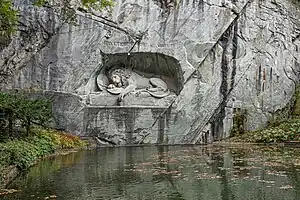List of colossal sculptures in situ
A colossal statue is one that is more than twice life-size.[1] This is a list of colossal statues and other sculptures that were created, mostly or all carved, and remain in situ. This list includes two colossal stones that were intended to be moved. However, they were never broken free of the quarry in which they were carved, and therefore they would be considered carved in situ. Most of these were carved in ancient times.

In many cases, especially in India, these sculptures were carved out of softer rocks like sandstone or volcanic tuff. However, in some cases they were carved out of harder rocks like basalt, or even granite in the case of the unfinished obelisk in Egypt. The Egyptians may have been limited to using 4.5-kilogram (10-pound) dolerite balls to chip away at the granite.[2] Dynamite was used in the carving of Mount Rushmore's Shrine of Democracy, one of the few colossal sculptures that was carved out of granite.
Africa
Egypt
- Great Sphinx of Giza – limestone
- Abu Simbel temples – sandstone
- The unfinished obelisk at Aswan – granite
- Seti I – limestone
Ethiopia
- Lalibela – tuff
Asia
Afghanistan
- Buddhas of Bamiyan, destroyed in 2001 by the Taliban
Armenia
China
- Fuxi sculpture at Xianshan Mountain, Xiangyang
- Leshan Giant Buddha
- Bingling Temple
India
Jordan
Lebanon
Philippines
Saudi Arabia
Sri Lanka
Americas
Colombia
Ecuador
Peru
- Chachapoya cliff tombs at Revash[3]
- Chavín de Huantar's Old Temple[4]
United States
- Mount Rushmore, South Dakota – granite
- Crazy Horse Memorial, South Dakota – pegmatite granite (work in progress)
- Stone Mountain, Georgia – granite
Europe
Bulgaria
Czech Republic
Greece
- Lion of Bavaria, Nafplio
Italy
- Pantalica, Sicily
- Santoni, Sicily
- Sassi di Matera, Basilicata
Poland
Romania
Switzerland
See also
References
- Collins online dictionary: Colossal "2. (in figure sculpture) approximately twice life-size."; entry in the Getty Art & Architecture Thesaurus® Online
- Edwards, Dr. I.E.S.: The Pyramids of Egypt 1986/1947 p. 269-273
- Archeology magazine Jan/Feb 2008 p. 40-45
- The Early Ceremonial Center of Chavín de Huántar, Berger p. 130